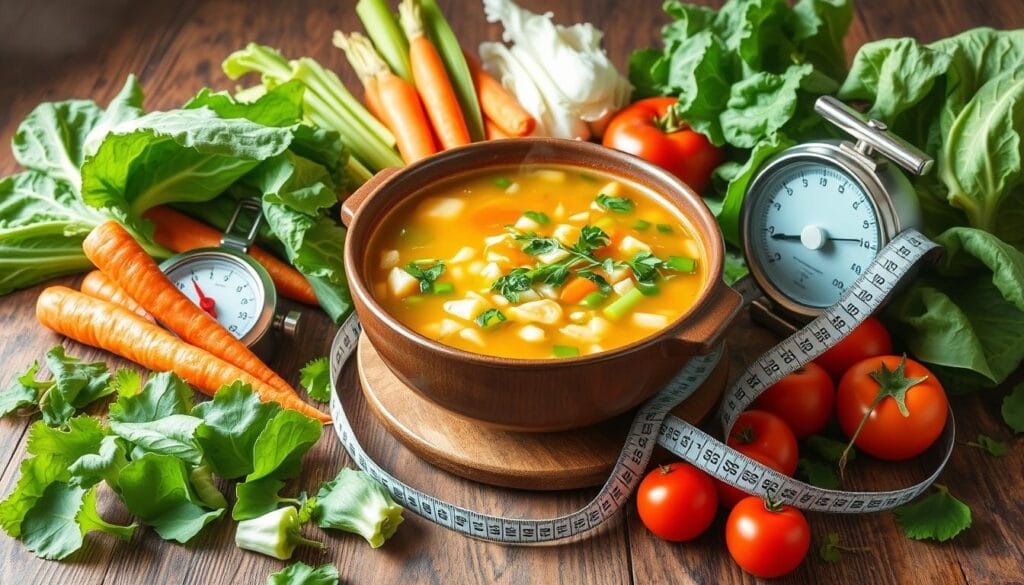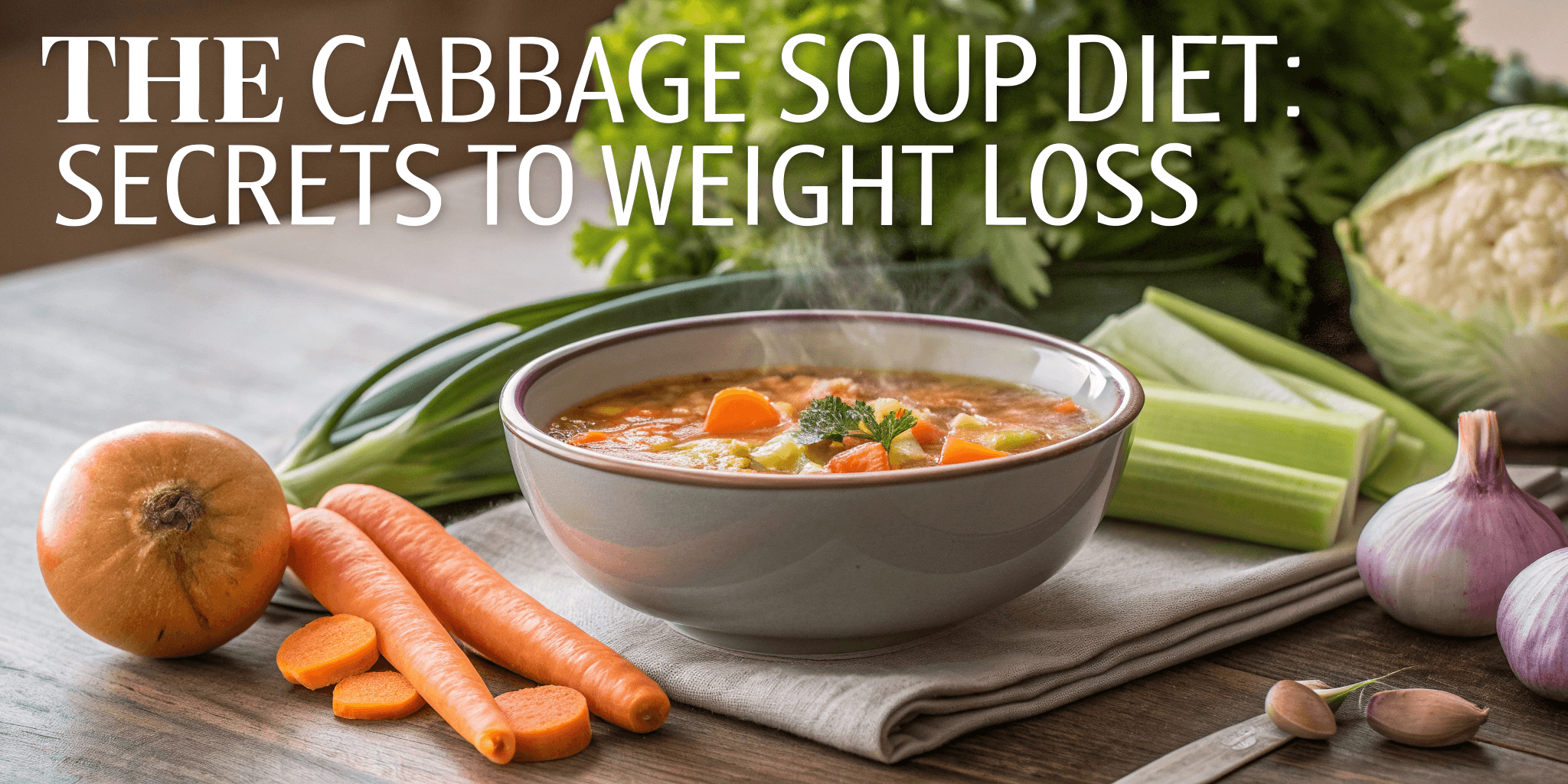Ever felt like you need to lose weight fast? The cabbage soup diet might seem like a quick fix. It’s a low-calorie diet that promises fast weight loss. It started in the 1980s and is now back in the “souping” trend.
This diet is simple and promises quick results. It’s for those tired of slow weight loss methods. Its promise of fast water weight loss has made it popular across generations.
This diet is more than a trend. Studies show soup diets can lower obesity risks and improve diet quality. A 2020 study found soup eating linked to lower obesity rates. So, the cabbage soup diet is more than just a quick fix.
Let’s dive into how this diet works. We’ll look at its benefits and the science behind its fast weight loss. Whether you’re into diets or a health researcher, this will give you insights into a popular weight loss method.
Understanding the Origins of the Cabbage Soup Diet

The cabbage soup diet became a big deal in the 1980s. It was a crash diet that promised fast weight loss. It caught the eye of many in the U.S. who wanted to lose weight quickly.
The 1980s Diet Phenomenon
In the 1980s, the cabbage soup diet was all the rage for losing weight fast. People were amazed at how much weight they could lose in just a week. Its appeal was simple and its promises were big.
- Originated in the 1950s
- Gained widespread attention in the 1980s
- Known by multiple names:
- Sacred Heart Diet
- Military Cabbage Soup Diet
- Russian Peasant Diet
Evolution into Modern Souping Trends
The cabbage soup diet started a trend of vegetable-based soups for weight loss. Why do you lose so much weight on the cabbage diet? It’s because of its very low calorie count and special nutrition.
Cultural Impact on Diet Culture
This diet showed our society’s desire for quick weight changes. Even though doctors warned of health risks, it became a symbol of our quest for fast weight loss.
“The cabbage soup diet represents more than just a diet – it’s a testament to our collective desire for instant solutions.” – Nutrition Expert
The Basic Principles of the Cabbage Soup Diet
The cabbage soup diet is a strict weight loss plan. It uses a special cabbage soup recipe. This soup is low in calories but still gives you the nutrients you need.

The diet is all about cutting calories. You eat a cabbage soup that has about 50 calories per cup. You follow this diet for seven days.
- Day 1: Primarily fruits (except bananas)
- Day 2: Focuses on vegetables
- Days 3-7: Gradual introduction of lean proteins and specific food groups
Your metabolism changes a lot on this diet. You eat very few calories, around 800-1,000 a day. This makes your body burn energy fast. Many people lose 5-10 pounds in just a week.
“The cabbage soup diet is not a long-term solution, but a short-term weight loss strategy,” says nutrition experts.
Drinking lots of water is important on this diet. You should drink 8-10 glasses a day. This helps with detox and keeps your metabolism working well.
| Nutritional Aspect | Per Cup of Cabbage Soup |
|---|---|
| Calories | 50 kcal |
| Protein | 2g |
| Vitamin C | 45% DV |
Remember, while the cabbage soup diet offers rapid results, it’s crucial to transition to a balanced, sustainable eating plan for long-term health and weight management.
Why Do You Lose Weight on the Cabbage Soup Diet?
The cabbage soup diet leads to quick weight loss through several ways. It affects how your body manages weight naturally. Knowing these changes helps you see the diet’s good and bad sides.
Extreme Calorie Restriction Effects
On the cabbage soup diet, you eat less than 1,000 calories a day. This low calorie count makes your body save energy. It uses stored energy fast.
- Triggers metabolic adaptation
- Accelerates initial weight reduction
- Creates significant calorie deficit
Water Weight Loss Explanation
The first weight loss is mostly water. When glycogen stores run low, your body releases water. This fast weight drop can feel good but isn’t lasting.
| Weight Loss Type | Percentage | Duration |
|---|---|---|
| Water Weight | 60-70% | First 3-5 days |
| Fat Loss | 20-30% | Throughout diet |
| Muscle Loss | 10-15% | Throughout diet |
Metabolic Changes During the Diet
Your metabolism changes a lot on the cabbage soup diet. Eating so few calories can slow down your metabolism. This makes it harder to keep weight off later.
“Rapid weight loss often comes with unexpected metabolic consequences that can impact long-term health and fitness goals.” – Nutrition Research Institute
While the cabbage soup diet might work fast, experts say it’s better to choose lasting, balanced ways to manage weight. This keeps your metabolism healthy for good.
Key Ingredients and Their Nutritional Benefits
The cabbage soup recipe is a powerhouse of high-fiber foods. It can change how you think about balanced nutrition. At its core, cabbage is a nutrient-dense vegetable. It’s packed with essential vitamins and minerals.
Let’s look at the nutritional profile of this diet’s key ingredients:
- Cabbage: A low-calorie vegetable with remarkable health benefits
- Rich in Vitamin C (98% daily value)
- Contains 25% daily value of dietary fiber
- Supports digestive health and immune function
- Complementary Vegetables:
- Carrots: High in Vitamin A (90% daily value)
- Celery: Low-calorie hydration source
- Onions: Provides additional flavor and nutrients
Nutritional Breakdown of Cabbage Soup:
| Nutrient | Amount per Serving | % Daily Value |
|---|---|---|
| Calories | 133 | N/A |
| Total Carbohydrates | 20g | 7% |
| Dietary Fiber | 7g | 25% |
| Protein | 3g | 6% |
“Nutrition is not about eating the right foods, but about eating the right foods that provide maximum health benefits.” – Anonymous Nutritionist
Warning: While the cabbage soup offers impressive nutritional benefits, it lacks complete protein and healthy fats. The diet should be approached carefully to ensure you’re meeting all your body’s nutritional needs.
For those seeking balanced nutrition, consider the cabbage soup as a nutrient-rich addition to your diet. It should not be a complete meal replacement. Always consult with a healthcare professional before starting any new dietary regimen.
The Science Behind Rapid Weight Loss Results
Looking into the cabbage soup diet shows a complex weight loss story. Losing weight fast doesn’t always mean it’s healthy. Your body reacts to eating very few calories in surprising ways.
- Short-term calorie restriction leads to quick weight loss
- Metabolism slows down as a protective response
- Muscle mass can decrease along with fat loss
Impact on Body Composition
The diet’s extreme methods change your body’s makeup. Losing weight fast doesn’t always mean it’s healthy. Your metabolism can get really upset by such big changes in diet.
Metabolic Response Mechanisms
Your body sees eating very few calories as a survival sign. This makes your metabolism slow down, making it harder to lose weight later. The cabbage soup diet might cause long-term metabolic problems.
| Diet Characteristic | Impact on Metabolism |
|---|---|
| Calorie Intake | Extremely Low (Around 800-1000 calories) |
| Weight Loss Rate | Rapid (10-15 pounds in 7 days) |
| Metabolic Adaptation | Significant Slowdown |
| Long-term Sustainability | Very Low |
Experts say slow, steady weight loss is better for your metabolism in the long run.
“Quick fixes rarely solve complex health challenges.” – Nutrition Research Institute
Health Implications and Potential Risks
The cabbage soup diet can be harmful to your health and nutrition. It promises quick weight loss but comes with many risks. These risks can be worse than any short-term benefits.
“Extreme diets are not sustainable solutions for long-term health and weight management.”
It’s important to know the risks of this diet. Here are the main health concerns:
- Severe nutrient deficiencies
- Muscle mass deterioration
- Electrolyte imbalances
- Metabolic disruption
- Potential cardiovascular stress
The cabbage soup diet is very low in calories. Eating only 600 calories a day can cause:
- Significant energy depletion
- Decreased cognitive function
- Weakened immune response
- Potential hormonal imbalances
| Health Risk | Potential Consequences |
|---|---|
| Nutrient Deficiency | Weakened immune system, hair loss, skin problems |
| Metabolic Slowdown | Reduced calorie burning, future weight gain |
| Psychological Impact | Increased food anxiety, potential disordered eating |
Medical professionals strongly advise against prolonged adherence to such restrictive diets. Sustainable weight management requires a holistic approach focusing on balanced nutrition and consistent lifestyle changes.
Comparing the Cabbage Soup Diet to Other Low-Calorie Diets
Looking into weight loss plans, it’s key to see how they stack up. The cabbage soup diet is unique in its approach to losing weight. It stands out from other diets in the market.
Effectiveness Rates Across Diet Plans
Weight loss results vary a lot among low-calorie diets. The cabbage soup diet can lead to quick weight loss in the short term. But, its long-term success is less clear. Experts recommend looking at different diets side by side.
- Cabbage Soup Diet: 1-5 pounds loss in 7-10 days
- Keto Diet: Significant weight loss through fat adaptation
- Whole30: Structured 30-day elimination approach
Sustainability Factors in Balanced Nutrition
Choosing a diet should focus on long-term health, not just quick weight loss. The cabbage soup diet is lacking in nutritional variety. This can harm your health and weight control in the long run.
| Diet Type | Calorie Range | Sustainability Rating |
|---|---|---|
| Cabbage Soup Diet | ~800-1000 calories | Low |
| Balanced Low-Calorie Diet | 1200-1500 calories | High |
| Portion-Controlled Plans | 1000-1300 calories | Medium |
Nutritional Adequacy Assessment
A study on soup diets showed they can improve diet quality. The key is variety and balanced nutrition.
Sustainable weight loss is about creating lasting, healthy eating habits, not extreme short-term restrictions.
Sustainable Alternatives for Long-term Weight Management
Looking for healthy ways to lose weight? It’s important to avoid strict diets like the cabbage soup diet. Instead, focus on a balanced diet and lifestyle changes.
- Make a balanced nutrition plan with whole foods
- Reduce calories in a moderate way
- Stay active with regular exercise
- Eat mindfully
“Sustainable weight loss is about creating lasting lifestyle changes, not quick fixes.”
Good strategies for sustainable dieting include:
| Strategy | Benefits | Calorie Approach |
|---|---|---|
| Mediterranean Diet | Heart-healthy, nutrient-rich | Moderate reduction |
| DASH Diet | Blood pressure management | Balanced intake |
| Flexible Eating Plan | Allows occasional treats | Controlled deficit |
Adding vegetable-based soups to your diet can be beneficial. They offer nutrients and help you feel full without strict rules. The goal is to adopt a sustainable method that supports your health goals for the long run.
Nutrition experts suggest making gradual changes you can keep up with. Aim for a 500-750 calorie daily cut, along with regular exercise. This method leads to steady, healthy weight loss without harming your metabolism.
Conclusion
The cabbage soup diet promises quick weight loss, up to 10 pounds in a week. But it’s not a good plan for lasting health. It’s low in calories, which can lead to fast weight loss. Yet, it misses out on the nutrients needed for long-term health.
For lasting weight loss, you need a balanced diet that’s more than just quick fixes. Your journey should include slow, steady changes. Add a variety of healthy foods and regular exercise to your routine. Nutrition experts say a well-rounded plan is key for good health.
Don’t jump from one extreme diet to another. Instead, work with health experts to create a diet that’s right for you. They can help you make healthy eating habits that lead to steady weight loss. The goal is to make lasting changes that benefit your body and mind.
Your health is more than just losing weight fast. It’s about making choices that improve your overall well-being. Focus on a balanced diet, regular exercise, and a healthy lifestyle for real, lasting results.

